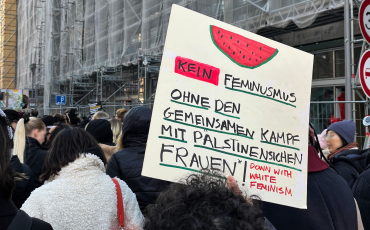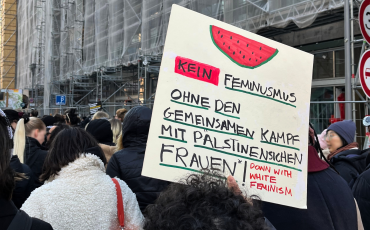The adoption and streamlining of differentiation measures represents a unique and effective European contribution towards Israeli-Palestinian peace at a time in which the Middle East Peace Process in its current configuration has failed.
This year has seen rising concerns relating to the disappearance of a viable horizon for achieving a two-state solution, and the emergence in its place of “a one-state reality of unequal rights, perpetual occupation and conflict” – to use the words of the EU’s High Representative and Vice-President of the Commission Federica Mogherini. This looming reality has underlined the extent to which European policy appears increasingly out of synch and unable to cope with trajectories on the ground and in the negotiating room.
Yet, despite all of its obvious flaws, the EU can nonetheless point to a few concrete achievements in defence of the two-state solution – measures that have become even more important given current trajectories on the ground and in Washington DC. Despite an American and Israeli policy turn away from supporting the two-state solution, the EU has helped maintain international commitment to Palestinian statehood in the West Bank, East Jerusalem and Gaza.
The pursuit by the EU of legally-driven differentiation measures – which require it to exclude Israeli settlements from its bilateral relations with Israel – have also played a key part in reinforcing international adherence to the non-recognition of Israel’s sovereignty in the Occupied Palestinian Territory (OPT) and the illegality of its settlement enterprise.
EU Differentiation keeps alive the 1967 lines
On the ground, there is less and less distinction between Israel and the settlements. Nor is there an Israeli economy that is distinct from the settler economy. But through its differentiation measures, the EU has at times successfully pushed back on Israeli efforts to erase the 1967 lines, and compelled Israeli authorities to alter their behaviour by repeatedly accepting to exclude the settlements from their bilateral agreements.
In order to preserve important aspects of its relations with Europe, Israel agreed to exclude settlement products from its Free Trade Agreement with the EU, and then signed up to the EU’s Horizon 2020 programme which excludes Israeli settlements entities and activities. Israel also did this when it vowed to enact its own differentiation within domestic poultry, dairy, and organic production lines to meet EU import standards.
Through its differentiation measures, the EU has succeeded in keeping alive the notion of the pre-June 1967 lines as the basis for a future Palestinian state, and maintained international consensus on the invalidity of the settlement enterprise. Such achievements illustrate that besides being a legally necessitated act to preserve the integrity of the EU’s legal order from Israel’s internationally wrongful acts, differentiation can support the EU’s policy objective of a two-state solution.
It can also have a normative effect on Israel by forcing it to modify its behaviour when engaging with the outside world. Last December saw the internationalisation and consolidation of these differentiation measures through the adoption by the UN Security Council of resolution 2334 which “calls upon all states…to distinguish, in their relevant dealings, between the territory of the State of Israel and the territories occupied since 1967”. This has already led China to exclude Israeli settlements from a recently signed agreement with Israel on providing Chinese construction workers, and could provide the impetus for further state-led action elsewhere, particularly in Latin America, and Africa.
Such measures chime with a greater awareness of third states responsibilities in situation of prolonged occupation, including the need to ensure that their businesses comply with international humanitarian law with regards to business activities that result in human rights abuses, such as those created by Israel’s settlement enterprise.
Differentiation successes clash with realities on the ground
But while differentiation has made steady progress, its implementation remains slow and uneven. As a result, its few successes to date continue to be outpaced by negative dynamics on the ground – most notably the erosion of the territorial basis for a two-state solution as a result of Israeli actions in the Palestinian territories, and the empowerment of the settler movement within Israeli politics and society.
In addition, EU successes in defending the relevancy of the 1967 lines as the basis for a future Palestinian state have been systematically countered by Israeli-led attempts to conflate Israel and the settlements within international minds, and distort the legal clarity with which international law views the occupied nature of the West Bank. At the same time, Israel and its allies have waged a concerted campaign to delegitimise and distort the legal and policy basis of the EU’s differentiation measures, including by deploying accusations of European anti-Semitism and double-standards. The Israeli government has also played an effective game to arm-twist and peel away member states from the EU consensus in order to blunt potential EU steps against its settlements. This has gone hand-in-hand with US Congressional and state-level legislation to constrain EU policy towards Israeli settlements and intimidate European companies who choose not to invest in settlement related entities or businesses.
On the other side of the spectrum, EU differentiation measures have been criticised by the grassroots BDS movement as being too soft on Israel, and for falling far short of the boycott of settlement products demanded by Palestinian civil society. Differentiation has also been criticised by some officials within the EEAS and some eastern member states for disrupting the EU’s relations with Israel at a time of continued efforts to re-launch the Middle East peace process and deepen bilateral relations.
Differentiation not a panacea but an important contribution
To be sure — differentiation by itself is not a panacea. It cannot substitute a lack of political willingness to hold Israel accountable for its violations of international law nor by itself bring a deeply entrenched occupation to an end. But a fuller and more effective application of such measures does however represent one of the few means currently available to impose real costs on Israel over its annexation of Palestinian territory and denial of Palestinian rights.
An important step in this direction would be to conduct a technical review of EU and member state agreements with Israel to identify areas in which Israeli settlements currently benefit from these bilateral relations. Such a move would be a concrete manifestation of the international community’s refusal to recognise the lawfulness of Israel’s settlement project, and remains a key obstacle to Israeli attempts to normalise its settlement project at home and abroad.
Hugh Lovatt is Policy Fellow and Israel/Palestine Project Coordinator for ECFR's Middle East and North Africa Programme, where he joined in August 2012. During this time, he has worked extensively to advance the concept of “EU Differentiation”, which was enshrined in UN Security Council Resolution 2334 (December 2016). His most recent publication is “Rethinking Oslo: How Europe can promote peace in Israel-Palestine” (July 2017).



















